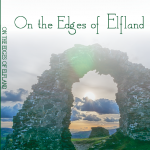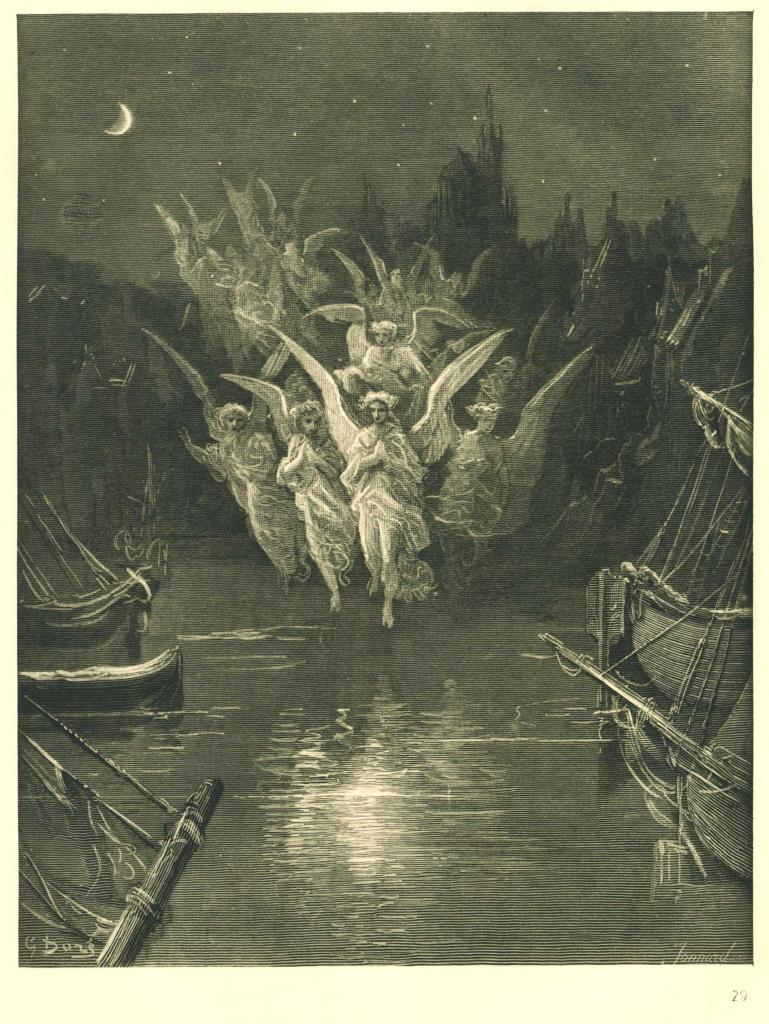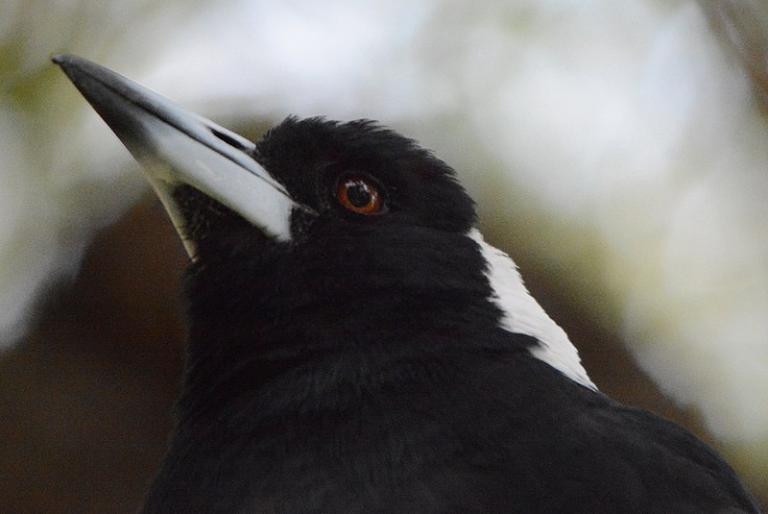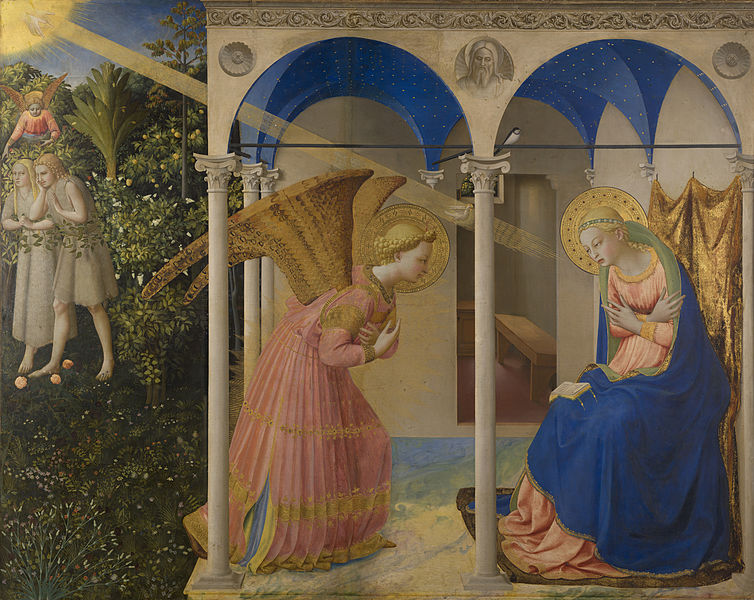David Russell Mosley
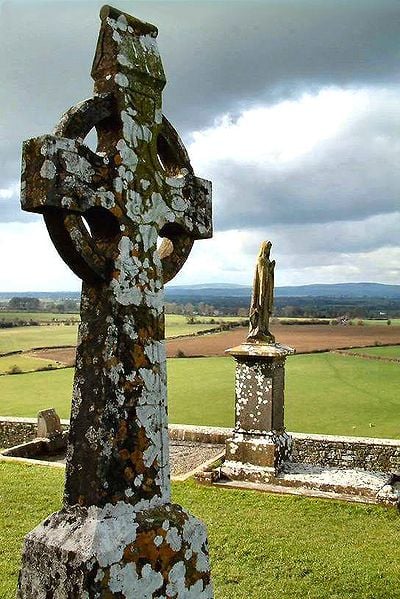
The photograph was taken by Chmouel. See [1]. It was originally uploaded to the English Wikipedia, with the upload history:
02:54, 17 Sep 2004 . . User:Redquark (90603 bytes) (photoshopped to add top part of cross)
18:33, 23 Mar 2004 . . User:Chmouel (115833 bytes) (High Cross in Ireland)
(CC BY-SA 3.0)
27 February 2018
The Edge of Elfland
Hudson, New Hampshire
Dearest Readers,
A reader recently sent me a link to the CBC Radio article, “Jesus Christ is my chief Druid”: meet the Anglican Priest who is also a pagan. I wasn’t entirely sure what I was going to find. The image at the top of the article was of Rev. Shawn Sanford Beck. On one side there was a picture of him in robe and alb delivering his homily. On the other he was cowled in a large forest green cloak, with a plaid shirt and staff. Rev. Beck refers to himself as a ChristoPagan, he is member of the Order of Bards, Ovates and Druids as well as an ordained priest in the Anglican Church of Canada.
I am intrigued by Rev. Beck, but I’m not certain his approach is precisely the right one. He is clearly, and openly, influenced by what he calls Neo-Paganism as well as “the writings of the early Celtic saints from the 5th to 7th centuries.” Yet I wonder what precisely he has been reading. The works of Columbanus, for instance, cannot have made up too much of his common fare since there is nothing by Columbanus that hints at this relationship between the “Celtic” church and the druids. Much of what we even know about druids is shrouded in mystery and pseudo-history created by nineteenth century antiquarians. So, I have to worry, even if only a small amount, about commitments to a past we cannot even ascertain the history of. After all, if we cannot be certain what the druids were or what they practiced, how can we have a resurgence that’s actually in line with their teachings.
This––to me––is the same problem one meets when addressing those who claim to follow the Old Norse religion. All of the written information about Odin and Thor and Ragnarok comes after Christianity had been introduced to the Scandinavian countries. Snorri Sturluson himself, one our chief sources, was reviving Old Norse myths in order to revive Old Norse poetry which he feared would be lost. Sturluson argues that Odin learned magic in the East and confounded the natives with it. I was once at a conference presenting on medieval cosmology (to which I shall return in a moment) where a professor was presenting on the similarities between Irish myth and Christianity. I asked her how we could be certain that the relationship was accidental when all of the stories were written down (or at least all of our copies come from a time) after Ireland had become fully Christianized. Unfortunately, I misworded my question and so she misunderstood and didn’t answer the question I meant to ask.
So my first reaction to this article is one of caution, not because I think Rev. Beck’s approach is necessarily dangerous spiritually but because it may very well be anachronistic. Another example is Rev. Beck’s statement about St. Columba calling Christ his chief druid. This comes from a song called the Song of Trust. It is attributed to Columba but I have not been able to find any hard evidence. It appears, I think, to originate from a Life of St, Columba written in the late nineteenth century. I can’t get my hands on the book, so I cannot look into it any more deeply, but I am leery of simply taking it on trust. Many songs have been written over the centuries and been attributed to all sorts of people, but we have no real evidence, nor even a predominant tradition. I should note that Beck does make reference to a Prof. Ronald E. Hutton at the University of Bristol. Hutton has certainly done research I haven’t, and I would be interested in reading his books on the evolution of paganism.
But what about what the good Rev. Actually believes? What makes him different from Christianity without “paganism”? In truth, I think the answer is not much, not for anyone with a proper understanding of theology and history. Beck says, “My theology is Christian, my cosmology is pagan.” Now, in the article this is never fully fleshed out, but it seems by pagan cosmology Beck means animism and, “bringing in the feminine face of the divine.” By animism, Rev. Beck seems to mean recognizing the inherent value of non-human creation. He says, “It’s about recognizing that that tree that I’ve been praying beside, is actually alive and conscious and praying with me. It’s about recognizing that if I’m having beef for supper I know who I’m eating, not what I’m eating.” On the face of it, this may seem very pagan indeed, but I’m not so sure.
As regards the feminine face of the divine, followers of sophiology would certainly say that this does not reside solely in the hands of the pagans (or even primarily). And Christians in the Middle Ages, and not just the ones from Ireland or Wales, certainly believed that trees were more than what we often think them to be today. Many, though by no means all, medieval Christians believed in fairies and elves, after all. What’s more, these Christians believed the planets were moved through the heavens by angelic intelligences that were, in essence, the gods of old. They also believed these planets had influence on the earth, caused various metals, humors in people, and events in history. And they believed all of this without the druids of Ireland.
In the end, I have no theological problem with the kinds of things it appears Rev. Beck does and believes. I believe nearly everything he talks about in this article (I have not read his book on Christian Animism) can be found in various Christian sources from very early on and from very far from Ireland––I think of Maximus the Confessor and logoi or Augustine and the angels guiding the kinds in Genesis 1 as intimately related to the interconnectedness of non-human and human creation. I don’t think I would ever go about reintroducing some of these ideas the way Rev. Beck is since I think we can find better sources for most if not all of them. Still, I applaud anyone who wants us to turn to a more interconnected, a faeriean understanding of reality.
Sincerely,
David


